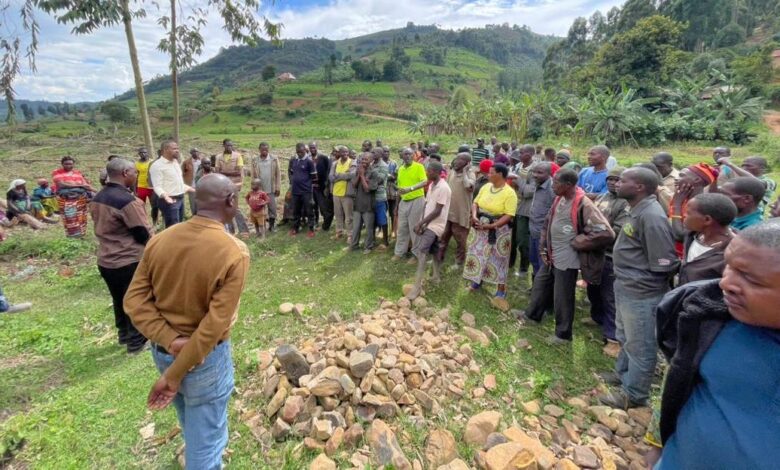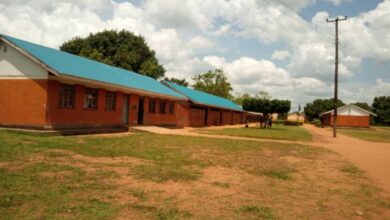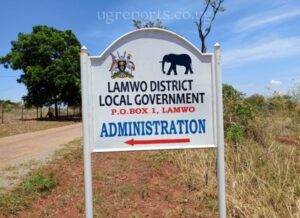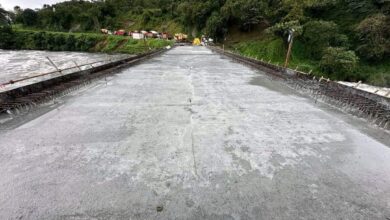Rubanda leaders, NEEMA officials in arms over destruction of farmers’ crops
Last week, authorities in Rubanda district initiated a comprehensive campaign aimed at restoring degraded wetlands in the area.

By Deguras Nshutaminabo
Rubanda: Rubanda leaders are up in arms with the Rubanda District Natural Resource Officer and officials from the National Environmental Management Authority (NEMA) over destroying people’s crops during the eviction process.
The crops were destroyed last week in the areas of Kyenyi and Kabere in Muko Sub County Rubanda District.
Last week, authorities in Rubanda district initiated a comprehensive campaign aimed at restoring degraded wetlands in the area.
The launch took place in the Karukara-Kanyambugo wetland in Muko sub-county, where a collaborative effort between authorities and local residents resulted in the removal of encroaching crops and trees.
This action is part of the government’s campaign aimed at restoring wetlands, launched last week under tight security and affecting approximately 100 households.
The affected residents witnessed the destruction of various crops, including Irish potatoes, beans, cabbages, maize, eggplants, and trees. This has heightened tension and raised concerns among the local community and some leaders.
Felix Mubangizi and Twinamasiko Barnabus, residents impacted by the wetland restoration process, highlight a lack of sensitization about the initiative.
They express fear of hunger and financial distress due to the loss of their crop gardens, emphasizing their inability to clear loans invested in their agricultural ventures.
Edith Nabasa and Annet Turyasima, also affected farmers, assert that they have used their land for years without any indication of it being a wetland. They claim proper acquisition of the land with legal titles and emphasize its role as their primary source of income.
Joan Kyomugisha, owner of a destroyed 3-acre garden of Irish potatoes, laments the loss of a substantial investment, including funds from the Parish Development Model (PDM). She anticipated a significant harvest but expressed disappointment with the government’s actions.
Other affected residents stress the need for government compensation before taking their land, emphasizing the longstanding use of these plots as their livelihood.
This move has sparked an outcry from residents in these areas, who have sought intervention from President Museveni through their representative, Moses Kamuntu, the Rubanda County West Member of Parliament.
The residents of Kyenyi and Kabere in Muko Sub County are expressing frustration at the lack of opportunity to let their crops grow before being forcefully evicted.
They emphasize the need for compensation, and those not yet affected plead for more time to harvest their crops.
In response to the concerns raised, Rubanda West Member of Parliament Moses Kamuntu visited the aggrieved farmers and pledged to address their matter on the floor of Parliament.
Kamuntu deems the incident a tragic violation of the president’s directive on wetland restoration. He disputes the destroyed areas being part of the designated wetland and announces his intention to pursue legal action for justice and compensation.
He emphasizes the importance of granting residents adequate time to cultivate and harvest their crops before eviction and declares that such acts of destroying people’s gardens without proper sensitization will not be tolerated.
The politician reveals plans to seek justice and compensation through legal proceedings.
Steven Ampeire Kasyaba, the Rubanda District LC5 boss, condemns the cutting down of people’s crops in the name of implementing the Presidential Directive. He criticizes the actions of NEMA and the Natural Resources Office, asserting that they deviate from the president’s directives, saying that they would have allowed the people to first harvest their crops in three months, but what they did is abominable.
Kasyaba says that when people die of hunger, the government will support them. The NEMA and the district natural resources officer should instead go and teach the people the best way to use the wetlands and the alternative way of survival. The government must negotiate with the owners of the wetland; they are the bonafide owners of the wetland.
“I was away in Kampala when they did all this; if I was around, there was no way I was to allow such evictions. These people are boniface owners of the wetlands. If the mistake was made by the Amin and Obote governments as leaders of Rubanda and Kigezi, we are prepared to meet the president because the people of Kigezi have no land. It’s becoming a crisis for the Kigezi people; they must be compensated before they leave the wetlands. I have ordered that the eviction be halted until the right procedures are followed,’’ said Kasyaba.
Kasyaba says that President Museveni cannot consent to evicting people without prior compensation, as most of the people that are in the wetlands have land titles and agreements to be there as leaders of Rubanda. We condemn, with the strongest terms, the acts that were done. Wetland is sensitive to the people of Kigezi as they don’t have land.
At least 100 farmers in Kyenyi and Kabere parishes were affected by this wave of forced evictions. Some residents have resorted to recultivating the destroyed gardens, citing a lack of alternative options.
President Museveni’s advice on wetland-related issues, particularly in regions like Bukedi, Busoga, and Kigezi, involves urging farmers to vacate unconditionally. He characterizes the presence of individuals in these areas as a mistake, specifying that indigenous residents within 100 meters of lake shores and riverbanks must relocate. Exceptions are granted to factories already established on wetlands.
Alarming reports highlight a 30 percent decline in the national area of wetlands in Uganda between 1994 and 2008, underscoring the urgency of addressing wetland conservation issues.
Do you have a story about your community or an opinion to share with us? Email us at theugreports@gmail.com.






